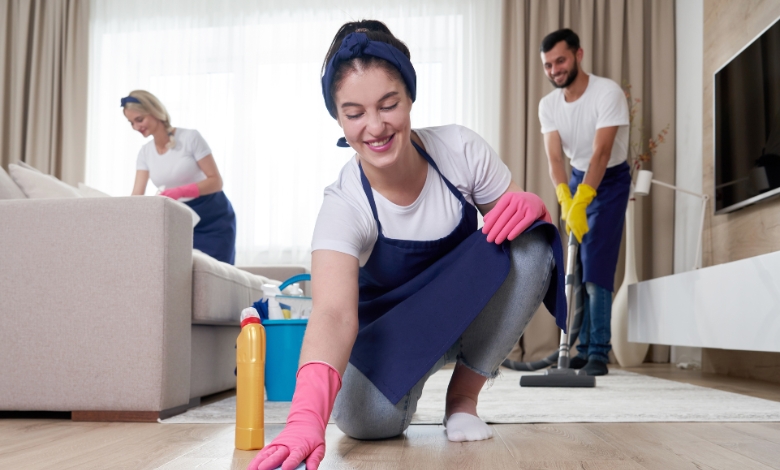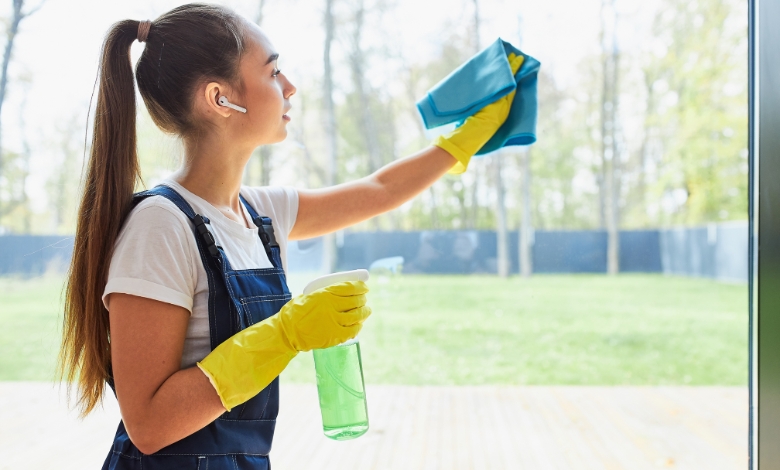Learn the essential steps to legally start your cleaning business, including what licenses do you need to start a cleaning business.
So, you decided to open a cleaning business with no money—congratulations!
Whether your dream is only to scrub your way up to financial independence or to launch a professional service with a team of cleaners, you chose one heck of an exciting path.
But before you actually grab that mop, there’s one essential piece of the puzzle that needs tackling: getting your licenses in order.
It may be confusing to navigate all the legal requirements, but here’s the thing: it is not that confusing once you know what to look for.
What follows is a step-by-step guide to getting the right licenses for your cleaning business so you can confidently start-up legally.
Let’s dive in.
Article Breakdown
Why Licensing Matters And Why You Should Care

Let me tell you one quick story. The very first time I ever thought of starting my own business, I thought licenses were an un-needed barrier of entry—something I could address later. Spoiler alert: I was wrong. One client asked if I was insured or licensed; unable to prove either, they hired another person.
Besides, licensing is not only legal, but it gives your clientele confidence that you are serious about the business and that their property is in responsible hands. Plus, all the fines for operating without proper licenses cost so much more than performing the right things in the first place.
So let’s dive in and make sure you don’t run into the same rookie mistake I did!
Step 1: Understand the Type of Cleaning Business You’re Starting
License types will be next. First, know your business type. Are you:
- Operating residential cleaning service – homes, apartments?
- How to start a commercial cleaning business: offices and retail spaces.
- Specialty cleaning—hazardous waste, biohazard?
Each of these different cleaning services has its own licensure and insurance requirements. Whereas a house cleaner might be content with just a general business license, for example, a specialized cleaner could be held to environmental certifications.
Pro Tip: Not sure where to get started? Just start off with residential cleaning. This usually has fewer requirements for licensing, so access to the market is rather easy.
Step 2: Research Licensing Requirements
Licensing varies depending on where you are. Here’s a breakdown of that:
General Requirements (Applicable in Most Areas)
Business License:
First step: You have to obtain a license for the business. It will register your cleaning business with your local government and provide the legality of commencing the operation. You can normally do this at your city or county clerk’s office.
Cost: $50–$200, depending on where you live.
Employer Identification Number (EIN):
If you plan on hiring employees, you’ll need to get an EIN from the IRS. It’s free and available online in minutes.
Sales Tax Permit:
Some states will require you to get a permit and collect and remit sales tax on your services. Check with your state’s department of revenue.
State or Local Requirements
Every city and state has its quirks. For example:
- California: Requires cleaners to register with the Contractors State License Board if specific services are offered.
- New York City: May require permits for waste disposal.
Think of it this way: Licensing is like buying a tailored suit—off-the-rack won’t fit your location precisely. A “one-size-fits-all” approach doesn’t work here.
Specialty Licenses
If you handle hazardous materials or provide specialized services, special certifications may be required. Such as:
- OSHA Certification: Biohazardous cleaning.
- Environmental Permits: To perform chemical heavy industrial cleaning.
Pro Tip: Reach out to your local SBDC for free consulting on what’s specifically required in your area.
Step 3: Apply for General Business Licenses
Getting your general licenses in place is easier than you might think. Here’s the process.
Choose Your Business Structure:
Decide whether to operate as a sole proprietor, LLC, or corporation. The LLC is popular with cleaning businesses because personal assets are protected from liability claims.
Register Your Business Name:
Make your business name unique and representative of your brand. For instance, assume you have to make a choice between “Sparkle Pros” versus “A+ Cleaning Services.” Which one would you trust more?
Submit Application:
Most cities have a way to do this online. Make sure you attach all necessary documents, whether that’s proof of insurance or zoning permits for working from home.
Step 4: Obtain Insurance and Bonding
Sure, licensing is one thing, but insurance and bonding are just as important. These protect your business and help reassure the clients that you are the real deal.
- General Liability Insurance: This covers all damage to client properties or injuries on the job.
- Bonding: In case an employee causes damage or steals something, the loss is covered by clients through bonding.
I once heard about a cleaner who, while working, had accidentally knocked over a vase worth $1,000. Luckily, her insurance covered it. How stressed would that have been without coverage?
Step 5: Certifications—go the extra mile
Certifications may not always be required, but they also give you a leg up on the competition. Consider these:
- Green Cleaning Certification: Demonstrate your pledge to eco-friendly methods.
- Carpet Cleaning Certification: The certification provided by the Institute of Inspection, Cleaning and Restoration Certification.
These credentials make your business more attractive to clients valuing expertise and sustainability.
Step 6: Sell Yourself as a Licensed Professional
Now that you’re licensed and ready to roll, it’s time to show it off. Add “Licensed and Insured” to your:
- Business cards.
- Website.
- Social network profiles.
It’s these minute details that help build trust, which could make or break the potential client’s decision to hire you.
Tip: Once I said “licensed and insured” in my advertising, I almost immediately saw a surge of 30% more inquiries. People like knowing they are working with professionals!
Frequently Asked Questions (FAQs)
How much are these licenses?
Prices vary, but the majority cost anywhere from $50 to $500 based on the license type and where you apply.
Do I need licenses if I’m a solo Cleaner?
Yes! Even if you happen to be a one-man/woman show, you will still need what’s called a general business license for your area.
Am I allowed to apply online?
In most cities and states, yes. Many cities and states have made the process quite smooth with their online application systems.
What happens if I skip licensing?
Fines, business shutdowns, and a ruined reputation. Believe me, it is just not worth the risk.
Key Takeaways
- Licenses are not the most entertaining thing to dive into when launching a cleaning business, but they are essential.
- They will, after all, protect you and lend credibility to your clients for permanent success.
- By following the steps in this guide, you’re already ahead of the game.
- You’ve done the hard part—taking that first step.
- Now it’s time to put your plan into action.
Useful Resources:
- State Department of Revenue for Sales Tax Permits: For a comprehensive guide on sales tax permits by state, check out Avalara’s state-by-state guide.
- OSHA Certification for Hazardous Materials: Information on HAZWOPER training, which is essential for handling hazardous materials, can be found on the OSHA website.



